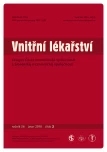-
Medical journals
- Career
Probiotics in acute pancreatitis – a randomised, placebo - controlled, double‑blind study
Authors: J. Lata 1; J. Juránková 2; O. Stibůrek 1; V. Příbramská 1; M. Šenkyřík 1; T. Vaňásek 1
Authors‘ workplace: Interní hepatogastroenterologická klinika Lékařské fakulty MU a FN Brno, pracoviště Bohunice, přednosta prof. MU Dr. Jan Lata, CSc., 2Oddělení klinické mikrobiologie FN Brno, pracoviště Bohunice, přednostka prim. MU Dr. Alena Ševčíková 1
Published in: Vnitř Lék 2010; 56(2): 111-114
Category: Original Contributions
Overview
Introduction:
Infections accompanying pancreatitis, particularly pancreatic necroses, represent a serious complication associated with worsening of the disease prognosis. The aim of our study was to explore whether this complication could be prevented by administering a probiotic.Methods:
The probiotic was administered to 7 patients and placebo to 15. The study was discontinued early following the release of the Propatria study results.Results:
There was no death in our patient sample and there was no difference between the two groups in microbial colonisation or the length of hospitalization. However, a reduction in endotoxin levels on day 7 and 10 of the hospitalization was observed in the probiotic‑treated group.Conclusion:
Based on the current knowledge, administration of probiotics in this indication is contraindicated. Nonetheless, reduction in endotoxin levels suggests a positive effect of probiotics on bacterial translocation, the importance of which should be evaluated in the future.Key words:
acute pancreatitis – probiotics – endotoxin – bacterial translocation
Sources
1. Bauer TM, Schwacha H, Steinbruckner B et al. Small intestinal bacterial overgrowth in human cirrhosis is associated with systemic endotoxemia. Am J Gastroenterol 2002; 97 : 2364 – 2370.
2. Timmerman HM, Koning CJM, Mulder Let al. Monostrain, multistrain and multispecies probiotics. A comparison of functionality and efficacy. Int J Food Microbiol 2004; 96 : 219 – 233.
3. Neoptolemos JP, Rarety M, Finch M et al. Acute pancreatitis: the substantial human and financial costs. Gut 1998; 42 : 886 – 891.
4. Baron TH, Morgan DE. Acute necrotizing pancreatitis. N Engl J Med 1999; 340 : 1412 – 1417.
5. Isenmann R. Prophylactic antibiotik treatment in patients with predicted severe acute pankreatitis: a placebo ‑ controlled, double‑blind trial. Gastroenterology 2004; 126 : 997 – 1004.
6. Mazaki T, Ishii Y, Takayama T. Meta‑analysis of prophylactic antibiotic use in acute necrotizing pancreatitis. Br J Surg 2006; 93 : 674 – 678.
7. Špičák J, Hejtmánková S, Hubaczová Met al. Antibiotická profylaxe infekčních komplikací u akutní pankreatitidy – výsledky randomizované studie s meropenemem. Čes Slov Gastroent Hepatol 2003; 57 : 222 – 227.
8. Powell JJ, Campbell E, Johnson CD et al. Survey of antibiotic prophylaxis in acute pancreatitis in the UK and Ireland. Br J Surg 1999; 86 : 320 – 328.
9. Banks BA, Freeman ML et al. Practice Guidelines in Acute Pankreatitis. Am J Gastroenterol 2006; 101 : 2379 – 2400.
10. UK Working Party on Acute Pankreatitis. UK guidelines for the management of acute pancreatitis. Gut 2005; 54; 1 – 9.
11. Havenaar R, Ten Brink B, Huisin’t Veld JHJ. Selection of strains for probiotic use. In: Fuller R (ed): Probiotics: the scientific basis. London: Chapman and Hall 1992 : 209 – 224.
12. van Minnen LP. Acute pancreatitis – Surgery, pathophysiology, probiotic prophylaxis. The Netherlands: Gildeprint Drukkerijen BV, Enschede 2006.
13. Olah A, Belagyi T, Issekutz A et al. Randomized clinical trial of specific lactobacillus and fibre supplement to early enteral nutrition in patients with acute pancreatitis. Br J Surg 2002; 89 : 1103 – 1107.
14. Besselink MGH, van Santvoort HC, Buskens E et al. Probiotic prophylaxis in predicted severe acute pancreatitis: a randomised, double‑blind, placebo - controlled trial. Lancet 2008; 371 : 651 – 659.
Labels
Diabetology Endocrinology Internal medicine
Article was published inInternal Medicine

2010 Issue 2-
All articles in this issue
- Prevalence of rheumatic manifestations and non‑organ specific autoimmunity in patients with autoimmune thyreopathy – editorial
- A few comments on the issue of infected myxoma – editorial
- Analysis and comparison of cohorts of patients with implantable cardioverter- defibrillator in primary and secondary prevention
- Prevalence of rheumatic manifestations and non‑organ specific autoimmunity in patients with autoimmune thyreopathy
- Probiotics in acute pancreatitis – a randomised, placebo- controlled, double‑blind study
- Risk of long‑term antisecretory treatment with proton pump inhibitors
- Direct renin inhibitor aliskiren in the treatment of cardiovascular and renal diseases
- The endocannabinoid system and interference with thrombogenesis
- Antithrombotic therapy in pregnancy
- Central diabetes insipidus in adult patients – the first sign of Langerhans cell histiocytosis and Erdheim‑Chester disease. Three case studies and literature review
- A case study of a young male patient with subacute constrictive pericarditis
- Infected myxoma as a cause of acute infective endocarditis
- Reappraisal of guidelines on hypertension management
- Internal Medicine
- Journal archive
- Current issue
- Online only
- About the journal
Most read in this issue- Central diabetes insipidus in adult patients – the first sign of Langerhans cell histiocytosis and Erdheim‑Chester disease. Three case studies and literature review
- Risk of long‑term antisecretory treatment with proton pump inhibitors
- A case study of a young male patient with subacute constrictive pericarditis
- Direct renin inhibitor aliskiren in the treatment of cardiovascular and renal diseases
Login#ADS_BOTTOM_SCRIPTS#Forgotten passwordEnter the email address that you registered with. We will send you instructions on how to set a new password.
- Career

